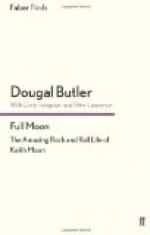He turned his steps in the direction of this thoroughfare in order to find out the locality, but stopped half-way at the sight of a coffee-stall on the opposite side of the street. He was hungry and thirsty, and he had learnt to like the safety of these places in his wanderings. The food might be coarse, but there were no lengthy waits between courses; no curious glances from the other patrons. A couple of half-drunken young men were feeding at this stall, and a girl of the streets was standing near them. In the light of a swinging lamp the scene shone clearly in the surrounding darkness—the brass urn, the thick crockery, the head of the stall-keeper bent intently over a newspaper, the munching jaws of the customers, the girl in the background with splashes of crimson paint like blood on her white drawn face.
Charles was about to cross the street, but at that moment a policeman’s helmet emerged slowly from the surrounding darkness as if irresistibly attracted by the concentric glow of the light. At the sight of him Charles shrank back into the friendly shadow of his own side of the road. The policeman emerged into the fulness of the light, serene in his official immobility. His slow yet seeing vision dwelt on the painted girl with a gaze as penetrating as that of Omnipotence in its profound knowledge of evil. He strolled towards her with a kind of indifferent benignity with which Providence has also been credited. He raised a hand, omnipotent with the authority of the law. “Better get away from here,” Charles heard him warn her, and she disappeared from view in obedience to this command.
So did Charles, but in quite another direction. There was something about these chance manifestations of authority, so lightly exercised, so unhesitatingly obeyed, which never failed to thrill and impress him, as they would have thrilled and impressed any other man in his present position. They seemed to intensify the hopelessness of his own situation. He had a slight feeling of creepiness about the spine as he thought of the narrowness of that escape—though, of course, the policeman might not have identified him. But some day or other it was bound to come—that accidental confrontation which might mean his arrest.
He walked swiftly until he reached the avenue. It was a part of London that he did not know, and appeared quite deserted. He wondered which way he should turn to get back to that area of London where he usually sought a bed.
As he stood there glancing about him irresolutely, his eye caught a glimpse of somebody walking swiftly along—a slight girlish figure dimly visible in the dark vista of the empty street. There was something familiar in the girl’s outline—something which caused his heart to give a great maddening jump. As he looked she turned into one of the converging streets.
He raced up the broad road, indifferent at that moment whether the eyes of all the policemen in London were upon him. When he reached the street which had swallowed her he could see nothing of the form which had excited him. Then, far ahead, he again saw it passing under a distant lamp-post and merge once more into the darkness. He ran quickly in pursuit.




